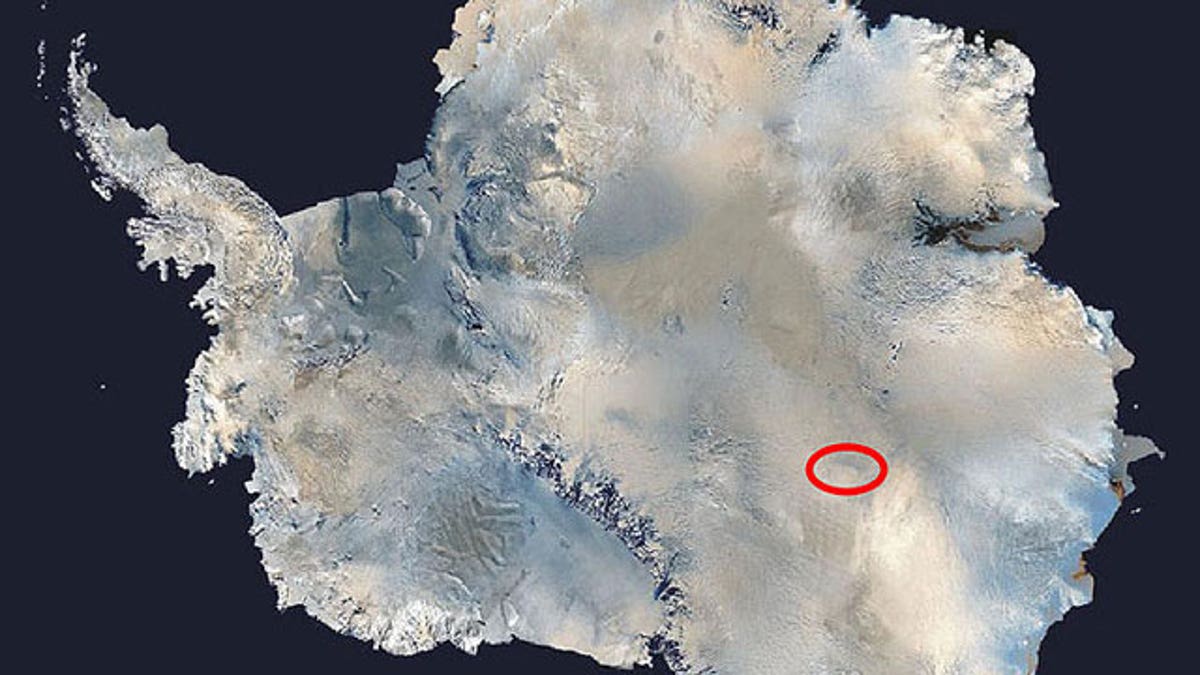
NASA photo of Lake Vostok in Antarctica.
The world holds its breath, hoping for the best after six days of radio silence from Antarctica -- where a team of Russian scientists is racing the clock and the oncoming winter to dig to an alien lake far beneath the ice.
The team from Russia's Arctic and Antarctic Research Institute (AARI) have been drilling for weeks in an effort to reach isolated Lake Vostok, a vast, dark body of water hidden 13,000 ft. below the surface of the icy continent. Lake Vostok hasn't been exposed to air in more than 20 million years.
The team’s last contact with colleagues in the unfrozen world was six long days ago, and scientists from around the globe are unsure of the fate of the mission -- and the scientists themselves -- as Antarctica’s killing winter draws near.
“When you’re outside, it’s extremely cold -- minus 30, minus 40,” microbiologist Dr. David A. Pearce told FoxNews.com. “If you left your eyes open the fluid in them would start to freeze. Your nostrils would start to freeze. The moisture in your mouth would start to freeze,” he said.
Pearce heads a team from the British Antarctic Survey on a competing mission, set to plumb the depths of Lake Ellsworth, one of a string of more than 370 lakes beneath Antarctica that may soon see light for the first time since well before Fred Flintstone’s ancestors roamed the planet. But time is running out for the Russian scientists.
“They need to be out by the 6th of February,” Pearce said, when winter sets in and temperatures drop another 40 degrees centigrade. Vostok Station boasts the lowest recorded temperature on Earth: -129 degrees Fahrenheit (-89.4 degrees Celsius).
The Russian scientists have been communicating with Pearce and colleagues at a third Antarctic expedition -- a study of the subglacial Whillans Ice Stream mainly featuring U.S. scientists. The competing teams have been watching the Russians and sharing notes over the past few days, Pearce told FoxNews.com -- yet no one knows what has happened.
“We’re all waiting with bated breath,” he said.
Antarctic scientists carry Iridium satellite phones for communication, he said, but there are spots without coverage. The scientists may have encountered a technical issue, he speculated, or perhaps they’ve simply packed up and are travelling home -- keeping their discoveries to themselves.
“I don’t think there’s anything sinister or ominous,” Pearce said. Still, the absence of information after nearly a week has the world’s scientists worried and wondering.
"Temps are dropping below -40 Celsius [-40 degrees Fahrenheit] and they have only a week or so left before they have to winterize the station," Dr. John Priscu -- professor of ecology at Montana State University and former head of the Whillans Antarctic exploration program -- told FoxNews.com via email.
"I can only imagine what things must be like at Vostok Station this week," he said.
Pearce knows well enough, having spent 15 years working in and on Antarctica. Vostok is right in the center of the Antarctic platter, he said, situated somewhat to the East. To survive the extreme colds there, scientists wear as many layers as possible and do everything they can to work indoors.
The actual well head itself would be enclosed by a tent, he said, and scientists would sleep in tents as well. But they must battle more than just the cold.
“It’s not just physically challenging, it’s psychologically challenging,” Pearce said. “You’re away from your family and friends, and there’s pressure to deliver the science you’ve promised. “
The Russian Arctic and Antarctic Research Institute did not respond to FoxNews.com requests for information on the status of the team, information that did not surprise Priscu.
“The Russians have their own way of dealing with things, particularly the media, which I respect,” he told FoxNews.com. “There is nobody to call.”
Other science institutions that typically conduct investigations in Antarctica did not respond to requests for information, including the National Oceanic and Atmospheric Administration (NOAA), the NSF’s United States Antarctic Program, or the U.S. Ice Drilling Program.
“They are running out of time to complete the drilling this year,” Pearce said.




















